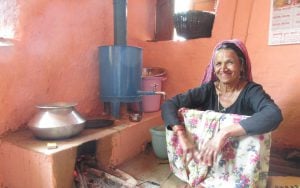Surrounded by the rocky lower-Himalayan mountains, the village of Chyamrangbeshi is returning to normal after the deadly earthquakes in 2015 – but in a different way to most. The village, known for milk-based sweets called ‘khuwa’, now has fisheries and poultry coops for the first time in its history.

There are now three poultry coops in the village and several fishponds, some of which have already started selling fish. It takes some time to stabilise fish ponds to a point where they can produce fish at a sellable scale.

The younger generation is also getting involved in these new businesses. Alongside his job as an accountant in a nearby school, Kamal Lama works in a fishery and has made good earnings from seasonal vegetable farming.
“I went to a fish hatchery in Kathmandu and bought fingerlings – they are growing now. I am hoping to sell them soon,” says Lama.

“Contractors have signed a yearly contract with us for khuwa and buy from us every day, so there is no problem for the market and demand is increasing,” says Uddhav Dahal, who owns one of the three khuwa factories in the village.
On average, the factories produce around 100 kilogrammes of khuwa every day, using milk sold to them by villagers each morning. Manually, the production of khuwa is a tough job.

Shifting from traditional to modern methods demands both knowledge and money. Ghimire has a plan to increase production and switch to machines run by electricity, but he worries about the taste; he has heard that machine-produced sweets don’t taste as good as those produced manually. He said: “There is too much confusion but I am seeking some support to bring in new technology.”
We want to hear from you! Tell us what you think about The Third Pole and you could win $100. Take our survey here.
![<p>Milk-based sweets ‘khuwa’, produced in the small production house of Tul Prasad Dahal Chyamrangbeshi, Kavre [image by: Nabin Baral]</p>](https://www.thethirdpole.net/content/uploads/2017/10/1E1A9044-300x200.jpg)



